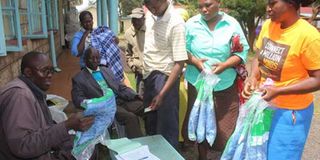SPONSORED CONTENT: MKU researchers working to bring down malaria burden

Women receive free mosquito nets from a community health volunteer in Uasin Gishu County. Scholars from Mount Kenya University are studying multiple ways to tackle the stubborn malaria parasite. PHOTO | JARED NYATAYA | NATION MEDIA GROUP
What you need to know:
Mr Makokha is one of several MKU researchers working to reduce the malaria burden.
His aim is to understand the severe forms of malaria and identify possible targets for vaccine development.
Dr Gitaka is also working on improving the diagnosis of malaria at the point of care.
With the war on malaria still on, calls have been made to all stakeholders to join in the fight so as to bring the disease down.
Mr Francis Makokha, head of the Human Health Research Programme in the Directorate of Research and Development at Mount Kenya University (MKU), argues that the success so far recorded against malaria is not absolute; it is a mere mirage.
Himself a researcher, Mr Makokha has his sights at the malaria parasite.
He cites the World Health Organisation 2016 Malaria Report, which shows that an estimated 212 million malaria cases were reported in 2015.
Over 90 percent of these malaria cases were reported in sub-Saharan Africa, with children below five years and pregnant women being the most affected.
Mr Makokha is one of several MKU researchers working to reduce the malaria burden.
DIAGNOSIS
He reports that Dr Jesse Gitaka, also from the university’s R&D, is currently working on a project to control and eliminate malaria in the Lake Victoria islands.
Dr Gitaka is also working on improving the diagnosis of malaria at the point of care.
R&D Director Prof Francis Muregi, Director of MKU Foundation Dr Peter Kirira, and Ms Hannah Nyakio, a lecturer in the School of Pharmacy, are working on developing hybrid drugs for malaria treatment.
Hybrid drugs consist of two different malaria medicines joined together as one molecule for ease of action against the malaria parasite.
Mr Makokha is studying the biology of the parasite.
DEVELOP VACCINE
His aim is to understand the severe forms of malaria and identify possible targets for vaccine development.
One challenge towards development of an effective vaccine against P. falciparum is the parasite’s ability to change the vaccine targets at a high frequency. This usually renders the responses to the administered vaccine less effective.
Additionally, Mr Makokha and Mr Bonface Malala, also from R&D, are studying the genetic markers of drug resistance in malaria parasites collected from patients.
He notes that reports from the national malaria control programme indicate that myriad interventions employed over the last decade have significantly reduced malaria cases. However, malaria researchers still report a high number of cases on average, especially during drug efficacy studies.
It is generally agreed, though, that the number of deaths attributable to malaria has reduced, the researcher acknowledges.
“While the malaria control achievements are laudable, the situation still remains grim,” argues Mr Makokha.
“The recent malaria epidemics reported in the country are just a warning of possible future outbreaks. That these epidemics occurred in low malaria transmission regions showed the need for early warning surveillance systems to stem the burden of the disease.”
CHALLENGES
Mr Makokha points out that the major challenges of malaria control in Kenya include resistance of the malaria parasite to anti-malarial drugs, insecticide resistance by the mosquito vector, change of feeding behaviour by the mosquito and socio-cultural practices.
He reports that parasite drug resistance has been the main challenge to malaria management in sub-Saharan Africa.
Chloroquine (CQ), introduced in Kenya in 1930s, remained the first-line malaria treatment until 1998 when it was officially replaced by sulphadoxine-pyrimethamine (SP) based drugs such as Fansidar.
This decision was made following confirmed resistance of the parasite to CQ that resulted in high levels of treatment failure.
SP drugs also failed after a short time, reporting over 65 per cent treatment failure in some endemic regions.
In 2004, there was a change in treatment policy that resulted in the adoption of use of ACTs as first-line treatment drugs.
Resistance to artemisinin-based combination therapy (ACTs) has been reported in Eastern Asia along the Cambodia-Thailand border. This is a cause for worry for sub-Saharan Africa.
TREATMENT FAILURE
“Early this year, treatment failure by ACTs was reported among patients who returned to United Kingdom after visiting Africa, two of who had visited Uganda,” reports Mr Makokha.
“This indicates that parasites circulating in the region may have acquired resistance to ACTs and a possible large-scale treatment failure might just be a matter of time. Heightened surveillance for resistant parasites is needed to better contain the spread.”
Current efforts to control malaria are focused on the development of an effective vaccine. These efforts have seen the development of a vaccine referred to as RTS, currently undergoing clinical trials in Kenya, Ghana and Malawi.
However, initial trials showed that the vaccine had an efficacy of about 38 per cent.
The main malaria control strategies adopted in Kenya (and much of sub-Saharan Africa) included accurate diagnosis of patients exhibiting malaria-like symptoms before treatment, enhanced coverage and effective use of insecticide treated bed nets (ITNs) to reduce contact between the mosquito vector, and public education through various media channels.
In support of government efforts, the MKU researchers hope to scale up their research and help reduce the malaria burden in Kenya and the region.




